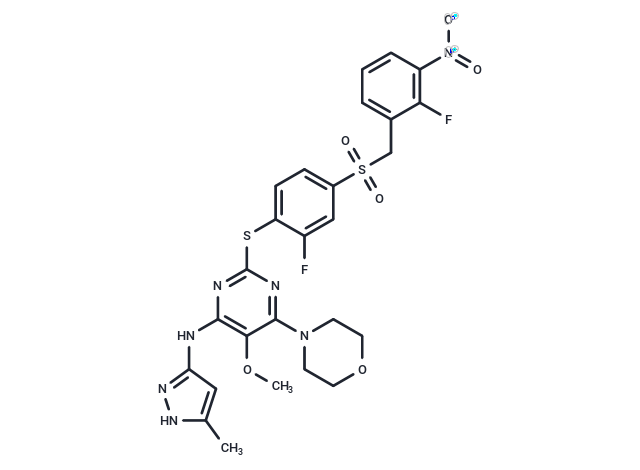Shopping Cart
- Remove All
 Your shopping cart is currently empty
Your shopping cart is currently empty

Centrinone (LCR-263) (LCR-263) is a reversible inhibitor of polo-like kinase 4 (PLK4; Ki:0.16 nM).

| Pack Size | Price | Availability | Quantity |
|---|---|---|---|
| 1 mg | $56 | In Stock | |
| 2 mg | $77 | In Stock | |
| 5 mg | $119 | In Stock | |
| 10 mg | $197 | In Stock | |
| 50 mg | $458 | In Stock | |
| 100 mg | $673 | In Stock | |
| 1 mL x 10 mM (in DMSO) | $167 | In Stock |
| Description | Centrinone (LCR-263) (LCR-263) is a reversible inhibitor of polo-like kinase 4 (PLK4; Ki:0.16 nM). |
| Targets&IC50 | PLK4:0.16 nM (ki), PLK4 (G95L):68.57 nM (ki), Aurora B:436.76 nM (ki), Aurora A:171 nM (ki) |
| In vitro | Centrinone (LCR-263) treatment causes centrosome depletion in human and other vertebrate cells and it treatment reduces centriole number in multiciliated Xenopus epithelial cells, which indicates that Plk4 also controls centriole amplification in differentiated cells. Centrinone (LCR-263) treatment of HeLa human cervical carcinoma cells leads to a progressive reduction in foci containing centriolar and pericentriolar material markers at each round of cell division, until most cells lack centrioles and centrosomes. Centrosome loss irreversibly arrests normal cells in a senescence-like G1 state by a p53-dependent mechanism that is independent of DNA damage, stress, Hippo signaling, extends mitotic duration, or segregation errors[1]. |
| Alias | LCR-263 |
| Molecular Weight | 633.65 |
| Formula | C26H25F2N7O6S2 |
| Cas No. | 1798871-30-3 |
| Smiles | COc1c(Nc2cc(C)[nH]n2)nc(Sc2ccc(cc2F)S(=O)(=O)Cc2cccc(c2F)[N+]([O-])=O)nc1N1CCOCC1 |
| Relative Density. | 1.59 g/cm3 (Predicted) |
| Storage | Powder: -20°C for 3 years | In solvent: -80°C for 1 year | Shipping with blue ice. | |||||||||||||||||||||||||
| Solubility Information | DMSO: 31 mg/mL (48.92 mM), Sonication is recommended. | |||||||||||||||||||||||||
Solution Preparation Table | ||||||||||||||||||||||||||
DMSO
| ||||||||||||||||||||||||||

Copyright © 2015-2024 TargetMol Chemicals Inc. All Rights Reserved.